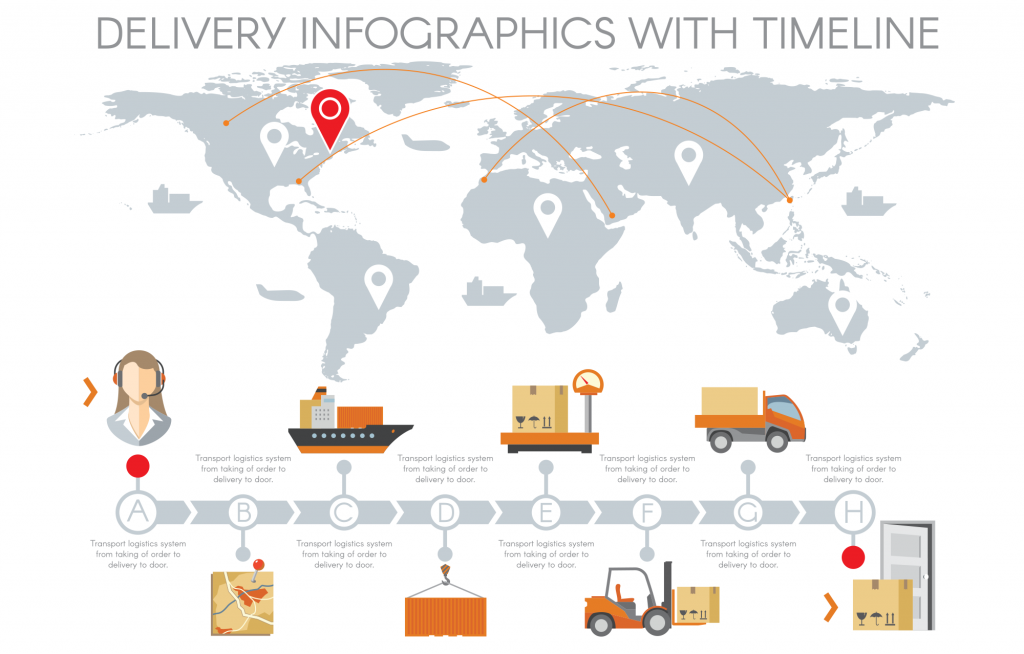
What is a Freight Broker and What Do They Do?
A freight broker is an essential part of the global supply chain, responsible for facilitating the movement of goods between buyers and sellers. They act as a middleman by connecting businesses with experienced motor carriers that have the necessary transportation resources to deliver products safely and on time. They are not to be confused with freight forwarders who we’ll talk about in a bit.
By providing an efficient link between these two parties, freight brokers can help streamline logistics operations and ensure the smooth delivery of goods across international borders.
With their extensive industry knowledge, they also provide valuable insights into market trends which can help businesses make informed decisions about shipping costs and other factors related to transporting goods. In short, freight brokers are key players in helping businesses succeed in today’s competitive market environment.
Since the motor carriers are independent contractors, it’s the broker’s job to manage everything and make sure the load arrives ontime.
The Definition of a Freight Broker
Simply put, a freight broker is an intermediary between the shipper (someone who needs goods moved) and the motor carrier (who provides transportation services).
A freight broker essentially arranges for the shipment of cargo on behalf of their clients and negotiates contracts with carriers to ensure their needs are met.
So in other words the freight brokers connect shippers (who need goods moved) with motor carriers (who have trucks to do the moving). Freight brokers manage the process and earn a fee for their work.
Think of them like real estate brokers. A real estate broker doesn’t actually buy or sell the house. Instead, they help arrange this on behalf of their customers.
The freight broker plays an integral role in ensuring that the needs of all involved parties get met.

What's The Difference Between Freight Brokers and Freight Forwarders?
A freight broker is a third-party logistics (3PL) provider that helps you arrange the transportation of your goods and supplies from one place to another.
The freight brokers provide the shipper with an easy solution to move their freight.
A freight forwarder, on the other hand, performs similar functions but with an additional feature; they are responsible for managing all the customs paperwork required for international freight transportation.
Why Freight Brokers Are Important to the Supply Chain
A freight brokerage provides acts as the intermediary between the trucking company and the shipper. They oversee factors such as loading cargo on the trucks and ensuring all the paperwork is in the correct order.
On the other hand, they help trucking companies and shippers create a win-win situation. Freight brokers are an invaluable asset to the global supply chain, playing a critical role in helping businesses move goods from one place to another.
They provide shippers with access to reliable and experienced motor carriers while also offering valuable market insights that can help make informed decisions about transport costs.
Moreover, freight brokers have the responsibility of managing all aspects of cargo shipping including paperwork and carrier payments.
With their extensive industry knowledge and expertise, they help both the motor carrier and the shipper.
The Responsibilities of a Freight Broker
When it comes to understanding the freight broker definition, it is equally important to understand the role a good broker is supposed to play in handling your shipment.
They have a wide range of responsibilities from finding new loads to working with the motor carrier. They also need to be familiar with the various shipping methods that are used – like trucks, rail, air, and ocean cargo.
A Few of Their Responsibilities Include:
Lorem ipsum dolor sit amet, consectetur adipiscing elit. Ut elit tellus, luctus nec ullamcorper mattis, pulvinar dapibus leo.
Background Check on Motor Carriers
The responsibility of your freight broker begins even before the cargo even loaded onto the truck, train, or ship.
It is the responsibility of the freight broker to thoroughly vet the motor carrier.
They need to make sure that the trucking company meets the necessary legal requirements for handling your shipment such as:
- They should be an authorized company
- They should have the necessary insurance
- Whether they are fit to handle the shipment
- Whether they are reputed and have an excellent track record
Supervising and Handling Every Aspect of Your Shipment
As soon as your freight broker has identified the best carrier, they will start scheduling the shipment of the cargo. The broker will lay out a complete shipping plan detailing everything from the start of the process to the finish line.
They will be responsible for arranging all the necessary paperwork and documents needed to load your cargo onto the trucks and dispatching them to their final destination. The details of your shipment will include:
- Pickup times and appointments
- In-transit activities and updates
- Implementing the necessary recovery options in case of a hiccup
- Collaborating with the right consignees to make all the deliveries
- Working to mitigate additional cost
The Difference Between a Freight Agent and a Freight Broker
So, what are freight brokers and how do they differ from freight agents? Good question. Well, the only difference between the two is that a freight agent works in tangent with the broker to take care of different aspects of the shipment. The agent actually works for the broker.
Freight agents are an essential cog in the machine in the sense that they help the broker move more loads. The agent is given some degree of freedom to manage the loads on behalf of the broker. The broker, in the meantime, manages other vital aspects, like finding more loads to move, communicating with the shipper, and grows their business.
When Do Shippers Need a Freight Broker?
This primarily depends on the types of requirements you seek as each business is different and requires different shipping needs. A shipper should work with a Freight Brokerage if they want someone to help reduce transportation costs or move loads more efficiently.
Another of the broker’s services is they often have their own carrier network (lists of reliable carriers they can work with). Also, they are masters of international freight transportation and know how to get your shipment through customs.

What Does It Take To Be A Successful Freight Broker?
If you’ve ever wanted to work in the logistics industry as part of the global supply chain then being a freight broker might be for you. A freight broker’s job is fast-paced and there’s rarely a dull moment. Since the freight broker connects shippers and carriers they have to be good with people.
A good freight broker also needs to be comfortable using technology, since using computers is a key part of your job. You’ll do much of your work over the phone, online, and often use things like load boards or freight broker software (IE a TMS).
In addition, knowing how to manage people, budgets and deadlines are helpful. You’ll often manage teams of freight agents and also try to negotiate cost savings with reliable carriers.
Important Terms in the Freight Brokerage Industry
- Shippers: These are businesses/manufacturers that need their supplies/goods to be transported.
- Truckers/Motor Carriers: These are trucking companies and they provide the truck driver. They provide the motor vehicles (AKA trucks) needed to ship the products. These are sometimes called: a freight carrier, trucker, or just a carrier.
- Freight Brokerage: This is the freight broker’s company. They often employ several freight agents.
- Import/Export Broker: These are companies or individuals that correspond with the necessary authorities that oversee both domestic and foreign shipments such as federal agencies, customs, and clearance, etc.
- Agricultural Truck Broker: These are companies that handle the transportation of authorized agricultural products like crops, grain, and such.
- Shipper Associations: These function sort like unions. They are nonprofit or cooperative entities developed by local shipping companies to help drive down overall operational costs by compounding different shipments under their individual memberships.
The Bottom Line
A freight broker is a vital link in the global supply chain. Acting as an intermediary between shippers and carriers. They help companies reduce transportation costs, increase efficiency, and move loads more effectively. An important aspect of being a successful freight broker is a good work ethic, people skills, and a desire to keep learning. If this sounds interesting, then an exciting and rewarding career as a freight broker might be for you!

